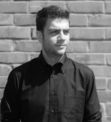Bleeding Edge

My rating: 4 of 5 stars
I always have the highest of expectations for any Pynchon novel. He has been a massive influence on me: The Crying of Lot 49 helped me figured out what I wanted to write. He is the master of literary pulp, blending the two in a way I have tried but failed to do.
This weight of expectation has the accidental effect of making me an unusually harsh critic, which I’ve tried to counterbalance a bit here. This is an incredible book, and if I say I didn’t like it as much as Inherent Vice, it’s only because I love that book so much.
The post-crash, pre-9/11 New York of Bleeding Edge is one I’m a little familiar with from visits during that time. Pynchon’s recreation of the time is almost pathological in its accuracy, with its Zima and Kozmo jokes (I remember my brother telling me about them with a shake of the head; everyone thought it was crazy even when they were in business) and web that now seems almost quaint in retrospect. It is playful, very funny, and dense in the best possible way: there are so many interesting things on each page I know I’m always missing at least half of what is going on.
I think it cast less of a spell than Inherent Vice because I actually remember that time. Wandering around in Pynchon’s painstaking recreation had an uncanny valley effect, whereas his sixties California was to me pure fantasia, a world I’d visited only through other people’s stories.
The book explores that penumbra between myth and reality, fact and belief, using conspiracy theory, espionage and the deep web. Being a Pynchon novel it promises no answers; the lack of any effective resolution is one of its points. If Inherent Vice was his noir, this is his paranoid thriller, and both excel at turning the rules of their respective genres in on themselves.
There is a famous Ross Suskind interview where a Bush aide calls their opponents “The Reality-based Community” and says that, as an empire, they made their own reality now. This withdrawal into magical thinking is an idea I’ve long been fascinated with: it was one of the reasons I wrote The Strange Trilogy. New York of that time is the fracture point, the crack in the ice of reality that spreads and spreads throughout the decade to come. Pynchon depicts this unraveling with incredible wit and a sort of dry terror: not the screaming, paranoid fear of 24, but a queasy feeling in the pit of the stomach, that after 9/11 nearly any nightmare is possible.
View all my reviews



